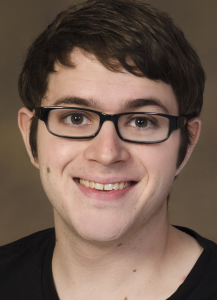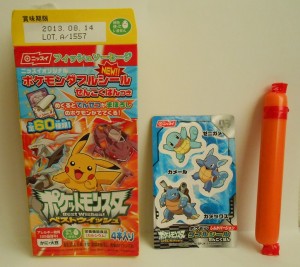Since the tail end of the 20th century, there have been a multitude of major changes to the field of information science. New technology, new practices, and new types of positions have all made their mark. With this in mind, it seems fruitful to seek out the perspectives of some of the field’s newest members. This is the first in a new series of interviews on UNBOUND, where we talk with young recent graduates from LIS Master’s programs, seeking their perspectives on important issues affecting librarians and information professionals today and in the future.
 Stephen Hall is a 24-year-old museum curator and special collections archivist. He has a Bachelor’s in Art History and a Master’s of Information Resources and Library Science from the University of Arizona, along with a combined seven years’ experience working in four repositories. His current occupation is Assistant Curator of the History of Pharmacy Museum at the University of Arizona, where he oversees a world-class collection of hundreds of thousands of historic items relating to the practice of pharmacy. On the side, he serves as the Director of Archival Operations for the Learning Games Initiative Research Archive, one of the world’s premiere collections of video games and electronic entertainment.
Stephen Hall is a 24-year-old museum curator and special collections archivist. He has a Bachelor’s in Art History and a Master’s of Information Resources and Library Science from the University of Arizona, along with a combined seven years’ experience working in four repositories. His current occupation is Assistant Curator of the History of Pharmacy Museum at the University of Arizona, where he oversees a world-class collection of hundreds of thousands of historic items relating to the practice of pharmacy. On the side, he serves as the Director of Archival Operations for the Learning Games Initiative Research Archive, one of the world’s premiere collections of video games and electronic entertainment.
UNBOUND: Could you tell us a bit about your work at the History of Pharmacy Museum?
Stephen Hall: As Assistant Curator of the History of Pharmacy Museum, I help to manage a collection of several hundred-thousand items, mostly circa 1880 to 1930. These items include historic medicines, apothecary tools and equipment, store fixtures, mortars and pestles, and somewhere in the realm of 100,000 pieces of glassware. We also have a lot of old snake-oil “miracle cures,” claiming to cure anything from earache to cancer. Everything from bottled radium water to anti-malarial medicine, laxatives, lotions, you name it, we have it. My responsibilities vary from day to day. Some days, I do exhibit research and design. Some days, I do website development. Some days, I update our self-guided tour brochure to reflect new stuff. Some days, I shoot and edit videos. Some days, I give tours. Some days, I just do simple cleaning and upkeep. My job is pretty versatile. I do whatever needs to get done in a given day.
UNBOUND: What unique challenges are you faced with when working with historical medical supplies?
SH: We have hundreds (probably thousands, really) of containers of raw chemicals, historically used in the pharmaceutical manufacturing process. We have a lot of materials that are poisonous/volatile/etc. It goes without saying, but I am extremely careful. I am not a scientist by trade, so I exercise extreme care when handling dangerous stuff. The truth is, I never really handle the materials at all. We might have a bottle of something poisonous, but that’s all I come in contact with, the bottle itself. I have no formal training in handling chemicals, but it’s ok, because I’m not really doing chemistry. I’m not opening the bottles and making a Polyjuice Potion. I am simply doing what anyone in my field does: managing a collection of things. It just so happens that the things I handle are sometimes highly radioactive. And honestly, if there ever is an accident, spill, or anything like that, the University of Arizona has protocols in place, as well as an Emergency Response Team, that would assist me. So I’m not worried.

UNBOUND: What’s it like to work at a video game archive?
SH: As Director of Archival Operations at the Learning Games Initiative Research Archive (LGIRA), I wear a lot of hats. Primarily, I help the two Co-Directors to curate the entire collection. This means I help things stay organized, and I try to make sure the archive is accessible to any interested party. Curating a special collection like this involves many unique tasks. Because most electronics often require specialized hardware/software (i.e. to play a game for an Apple II computer, you need to have a physical Apple II.), it’s important that we not only keep games themselves, but also the necessary peripherals. We do a lot of repair, too. Old-school games were never built to last, so the solid-state electronics need some TLC. We also need to periodically test things to make sure they work (yes, that means we get to play video games). Work at LGIRA mostly consists of stuff like this, super-specialized day-to-day operations.
At LGIRA, we have a lot of cool things in our collection. I think my favorite is a copy of “Halo” for the original Atari. Yes you read that right. Designer Ed Fries, who worked on the first XBox “Halo” made a retro, re-imagined version for the Atari 2600. It’s a very interesting nod to the past, and a symbol of the continuing influence of old-school games.
Some other notable items are the Magnavox Odyssey (the first home video game console), the Power Glove, adult video games and game-inspired XXX movies, and various food/beverage tie-ins like Mountain Dew “Game Fuel” and Japanese Pokémon-brand fish sausages. FISH. SAUSAGES.
Basically, I use these items to demonstrate how vast video game culture is, and how significant of an impact it has on our society. If a visitor comes to the archive and tries out the Magnavox Odyssey, they might just develop a new appreciation for modern gaming. By learning the history of something, we can enhance our understanding of it. By experiencing the simple “blinking dot on a screen” games of the 1970s, how much more can we enjoy and celebrate the innovations that have happened since? By playing the games that today’s designers played as kids, how much more can we appreciate their work today?
UNBOUND: What skills could be taught by MLIS programs which would aid you in your positions today?
SH: I have worked in four repositories, so I have seen several different management methods, cataloging schemes, etc. In the Pharmacy Museum, for example, because our collection is so specialized, you have to think outside the box to manage it. There isn’t really a classification scheme for pharmaceutical artifacts, and you can’t exactly use the Dewey Decimal System for it. Thus, I have to come up with my own strategies to catalog and manage the collection.
I deal with thousands of medicine bottles. I could organize them alphabetically, by the name of the medicine inside, but then what if I want to retrieve all the medicines from one manufacturer? They would be all spread out and tough to find. What about corporate buyouts? Schering was recently bought out by Merck, so do I put Schering stuff with Merck stuff? It’s the same type of problem that traditional librarians face, just with different metadata.

There are too many different types of collections out there, enough that it’s simply impossible to train students on how to manage every possible kind of collection. Let’s be honest, how many other pharmacy museums do you know of? Thus, I don’t think LIS programs should try to educate their students about everything. Odds are, about .001% of librarians will work in a pharmacy museum, so teaching that formally seems fruitless.
I think LIS programs need to emphasize the ability to learn new and unfamiliar cataloging systems on the job. Instead of teaching how you manage specifically books within specifically the Dewey Decimal System, specifically in a public library setting, they can teach the general facets of the theory. How do these problems differ if you’re using LOC classification? MeSH? What if, instead of books, you’re working with a giant collection of Pez dispensers? You can teach students how to think critically and problem-solve on the fly, without relying purely on book shelving theory.
UNBOUND: What areas of digital media and information technology should LIS programs focus on?
SH: All of them. Digital media and the internet are here to stay. They have completely reshaped the way our entire world runs. We as information mediators need to embrace that. Yes, that means teaching programming. Yes, that means teaching social media. Yes, that means completely rethinking the way LIS programs have traditionally been run. In order to best prepare the information professionals of tomorrow, we need to be pushing boundaries. We need to be on the cusp of technology and innovation. We need to be forward-thinking.
As information grows and changes at an ever-increasing rate, we as information professionals need to keep up with the tide, lest we get swept away in it. We always need to be looking ahead, never getting comfortable with the way things are.
Ultimately, we as librarians and information professionals need to face the facts: the times, they are a’changin’. The old model of librarianship simply doesn’t work anymore. This is not to say that libraries aren’t important. Quite the opposite. Libraries are critically important. That’s why we need to fight so hard to keep them alive. But this might mean changing the way we do things. And that’s okay.
For more of Stephen’s writing, you can visit his two blogs. One contains general musings on geek culture, the other contains reviews about board games.
(Post by Derek Murphy)
Stephen Hall’s insights into his multifaceted role as a museum curator and special collections archivist highlight the diverse and evolving landscape of the Library and Information Science (LIS) profession. His work with both the History of Pharmacy Museum and the Learning Games Initiative Research Archive demonstrates the importance of adaptability and innovation in managing specialized collections, from historical pharmacy artifacts to video game ephemera. Hall’s emphasis on the need for LIS programs to focus on critical thinking, problem-solving, and flexibility in cataloging systems is a timely reminder that future information professionals must be prepared to navigate a vast array of collection types and technologies. Furthermore, his advocacy for integrating digital media and emerging technologies into LIS curricula reflects the ongoing transformation of the field, urging educators to equip students with the skills necessary to stay ahead of rapidly changing information landscapes.